Hello Gentle Entities and Fricasseeable Frenemies!
Today is National Simplicity Day in the land where Hipsters of the Coast runs it’s central operations in the Multiverse. As an appreciative Expat I exert myself mightly to understand the “why” of local cultural celebrations. A society with a legal code containing 48,000 sections for national laws, to say nothing of the hundreds of thousands of state and local codes in addition to those. When one considers that the only method of monitoring the various laws interactions and conflicts can only be determined once someone brings things to adversarial court systems, which then often live through several appeals I can certainly understand why my adopted homeland could feel the need to set aside a day to consider “simplicity.”
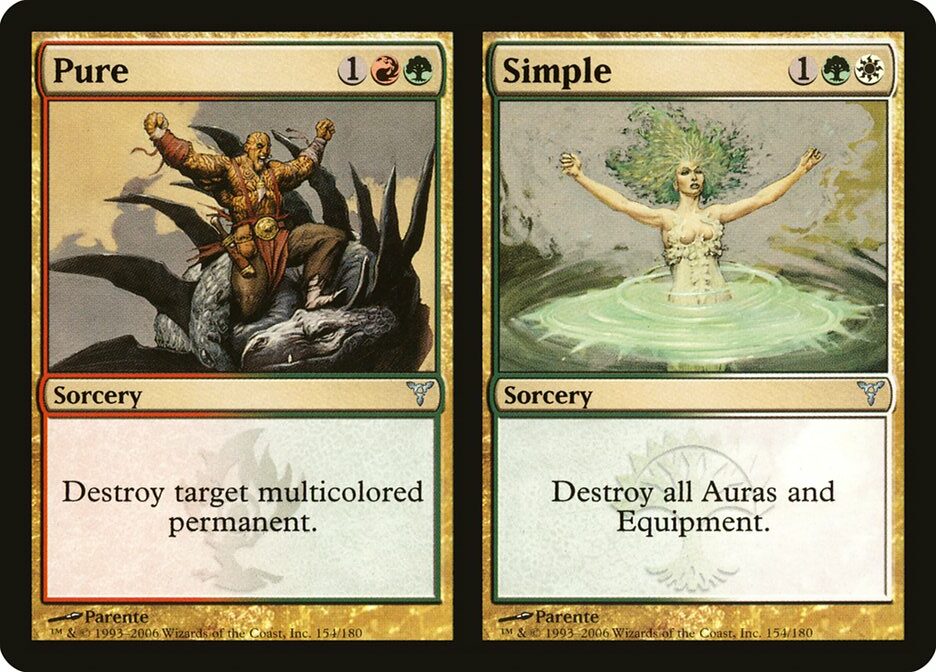
Things which are mysterious and unfathomable often incur a holy status across the various planes of the Multiverse and the celebration of that which is hard to achieve is frequently honored thus Simplicity Day seems quite understandable.
However it also appears to be a celebration somewhat connected to the poet Henry David Thoreau, who is responsible for a quote that will resonate strongly with my fellow planeswalkers:
…the cost of a thing is the amount of what I will call life which is required to be exchanged for it, immediately or in the long run,” Walden, “Economy.”
In today’s column we shall address why simplicity, while ideal, is often unachievable while playing collectible cards games.
As this is our twenty-seventh column, we at Mizz Mizzet’s School for Complicated Lifeforms would like to remind you that we answer between 1-3 letters from our interrogative entities across the multiverse each week.
This week we shall focus on a single question involving the etiquette of offering advice.
If you missed our initial column, you may peruse it at your leisure at this location.
Content Warnings
Mizz Mizzet’s Guide to Magical Manners is pleased to provide Content Warnings, given that solving bad behavior often means describing bad behavior.
Dear Mizz Mizzet;
I play Magic the Gathering in lots of different places and I love token decks. Infinitokens have helped with the problem a lot but in the last few years – like especially since Ahmonkeht where things are embalmed, and like suspend, and storm count, and uneven buffs on creatures during play and “hey how much commander damage has each commander dealt me” I get really confused looking at anyone’s board state.
The thing is in my local game store we have a few people who get really rigid about indications on board states and use it to try to get an edge or call over a judge during head to head play. I had that happen to me and stopped using tools that allow me to read even my own board state better. But I’m going to be honest, it’s almost getting to the point where it’s hard for me to play any of the current sets . There’s SO much complexity!
Is it rude to ask people to mark their own board states clearly? It felt rude when it was done to me in competitive play. I don’t want to do that to other people. Also are the competitive rules really that limited (I put a die on as a marker for myself but an opponent felt it was misleading)?
Is it rude to ask people to check things in multiplayer games or walk over to see their board state?
I realize some of this might just be a “me” problem.
Thanks in Advance!
Fire Penguin
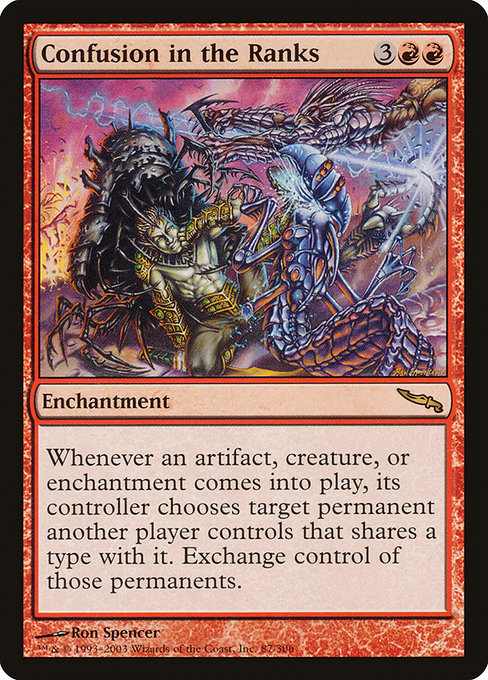
Dear Fire Penguin;
While there are different levels of formal play, at a casual game between friends who are known to each other, it is unlikely that a request such as “I’m having trouble keeping track of how many elves you’ve made with that last combo – would you mind using the twenty sided dice on a token so I can understand your board? would cause a problem. A simple request between friends should also ALWAYS be followed by a thank you. “Please” is an amplifier and while lovely, not necessary, but an entity accommodating a request of yours should ALWAYS be recognized with formal gratitude no matter how close. Our friends and loved ones should not be taken for granted. Closeness relaxes the rules of etiquette but does not create an exemption.
However, my dear flammable spheniscida, this will not answer your question if you are playing with community members or strangers in a pick up game. While “Rule Zero” discussion can cover a number of tone and technical issues, including things like “allowable tokens” or reasonable expectations of where things go on a board, many things that make a complex board state a difficult read are only thought of when they show up on the board.
Two weeks ago we addressed a similar question about the proper etiquette for sharing board state information in games of Commander – while that column dealt with the very specific issues of multiplayer gaming and how to work collaboratively at a commander table, It was the suggestion of our Metagame Mizziteers that following the best practices of the Rules Enforcement Level of competitive play also happened to be the most polite method of playing where it’s difficult to keep all of the board state in both the mind’s and the body’s eyes.
Your question is more specific. It is less about sharing the board state and more about “What can I put on the board to keep track of my own board state.” and “Can other people tell me what I may and may not put down and may I ask other people to maintain their board state in specific ways.”
One of the eccentricities of our communal game is that the rules are so many, varied, and conditional, that frequently players do not know they exist until they violate them.
Indeed entities can often play in a way that violates existing rules for a very long time until they run into an opponent or an observer that knows the rules better than them and calls it out during a duel. This system has a variety of negative impacts on organized play. One of these impacts is that frequently typed advice to “just know the rules” is not a realistic option. (It is also rude, therefore rendering the typist ethically edible in many planes). The small package inserts may be the only exposure some players have to the official rules set. Peer-to-peer mentoring situations are constrained by the local knowledge base navigating randomized Magic articles.
So you will be happy to know there ARE rules that govern the board state. Let’s look at them together:
- The first thing is that in competitive play, your lands should be closest to your physical manifestation. You will find some community elders who put their lands up at the top of their play area. One must respect one’s elders and gently correct them informing them that Organized Play has standardized land placement to be consistent.
- Non creature permanents associated with land or the creation of mana can also be kept in the same place you keep your lands.
- Creatures who are also lands must also be kept with other creatures.
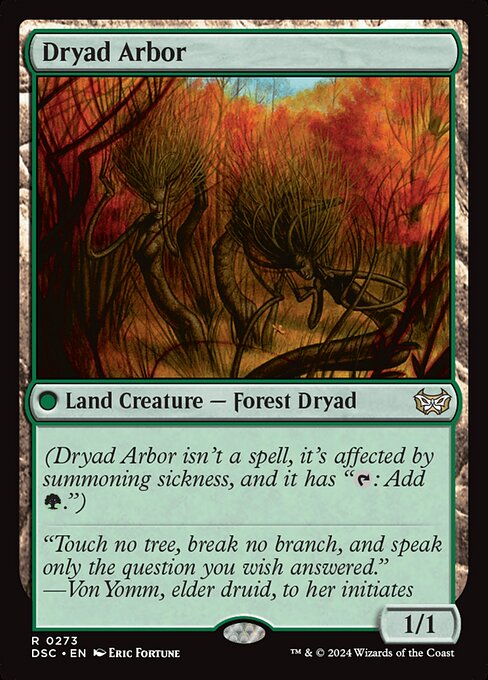
This one is important given that previous column regarding proper etiquette for handling cards in a commander game:
- “Each card should remain clearly associated with any permanents attached to it. For example, an Aura enchanting a land should be in the land area in contact with that land.”
- A player gets to choose whether they keep their library, graveyard and exile piles all to the left or all to the right of the battlefield but they cannot split up the library, graveyard and exile piles. I personally use the left.
So this may be the first serious point of board state difference where one player may believe that the location of your library etc, is more regulated than it actually is and attempt to use an “appeal to authority” claiming that your cards must be on either the left or the right in order to enforce something they feel is either mandatory or more readable. If there is no judge available it can take on a type of urban myth quality. I have indeed watched people be quite agitated when trying to impose a form of homogeneity on it. However the existence of “learn to play” playmats with both configurations shows the proper placement in natural variants such as these from InkedGames by Old Hat Studios
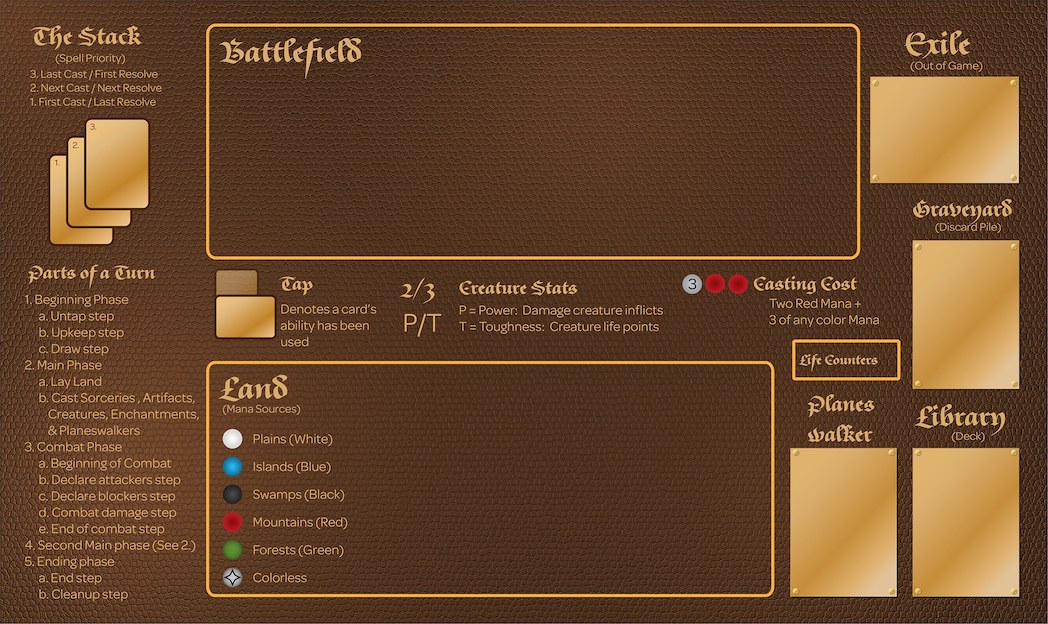
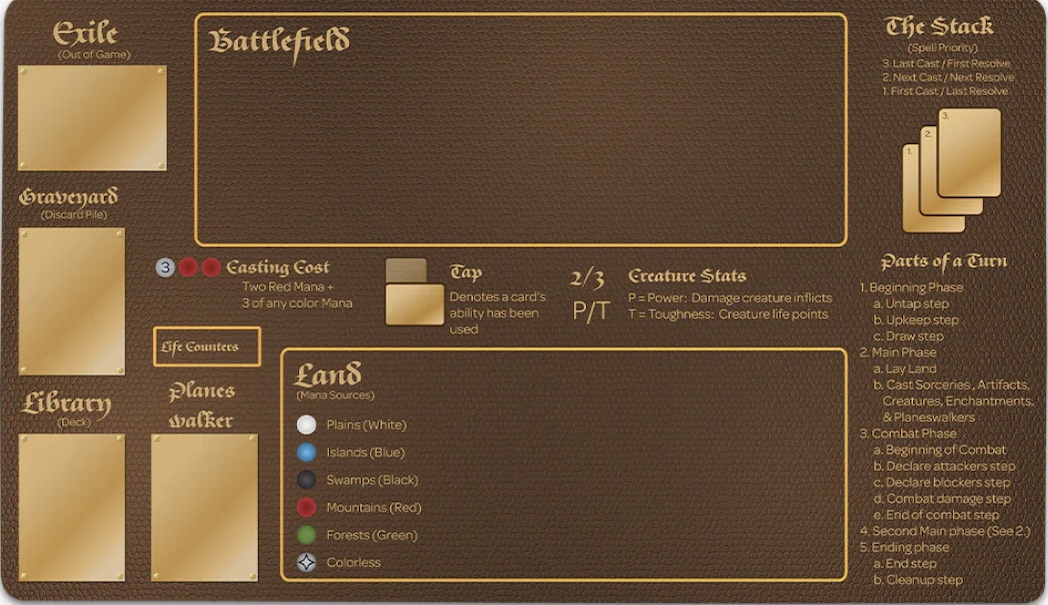
Source: https://www.inkedgaming.com/products/learn-to-playmat?variant=23794229889
These playmats neatly illustrate the following continuation of the official rules:
- The graveyard and the exile pile need to be adjacent to the library. Cards that are temporarily exiled by permanents on the board are to be kept adjacent to each other and it is strongly recommended by judges that you keep the exiled cards underneath the permanent that is keeping them exiled. Also additional card interactions are noted on the board in this manner:
- If a card is exiled by a permanent and that permanent includes a way to perform additional actions with the exiled card, the association of the two cards must be clear. Keeping the two cards together is recommended.
And finally your cards should be facing you. Your opponents cards should be facing them – cards may be turned upside down as a memory aid.
This is written explicitly and is also one of the reasons it is always acceptable to ask your opponent to read the card. So to answer your inquiry “Yes, indeed the rules for “what to do with your cards tokens and memory aids that are all on the same board are indeed very minimal” which leaves a great deal of room for personal expression and difference of opinion over what “clear” might mean.
These are the only things clearly defined in the official rules regarding specifics of maintaining board states according to the IPG.
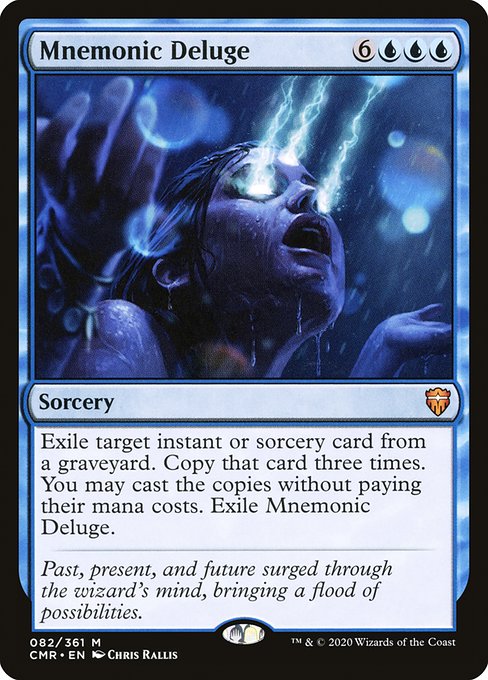
So these are the rules. The rules define the etiquette but being polite is closer to “manners” which are more closely involved with the way we treat each other.
So I now offer the answers to your other questions – Before you mark a new item on your board the most polite thing to do is explain it and await consent/affirmation:
For example:
“Ok since you have hit me with Galadriel gift giver for four commander damage – I’m going to be using this green life counter to track that because I might get hit by the other commanders – is that OK?” and when the table responds yes it allows you to ask “How are you tracking the nine points of commander damage? Would you mind arranging that so we can see?” That is also a good time for the table to reach agreement in multiplayer or in head to head so everyone is clear moving forward, and each player’s needs for board state clarity are met in either organized or casual play.
However you may run into a situation in organized play where you need to have a clear board state of your own and you run into a rude or recalcitrant rules lawyer who refuses to cooperate from some misguided idea that staying strictly within the letter of the law is equivalent to a strategic advantage.
The proper and appropriate thing to do in such cases when your opponent refuses to communicate with you is to say “I appreciate you are within your rights so I’m sure you will understand as I check what I intend to do with a judge to make sure that I stay within the proper guidelines for legible board states.”
If they try to avoid having a judge participate in the match after refusing to work out board states with you it is most likely best for you to have a judge present anyway. Please feel free to discuss boards, markers, tokens and card placement with mnemonics in the same manner you would politely discuss such things with your friendly group. Your opponent may be your adversary but a judge is the advocate for the game itself and not inherently adversarial. If your opponent keeps attempting to refuse to communicate with you or seems to be attempting to trick you into a rules violation they may find themselves answering a judge’s finding of unsporting conduct.
And finally we would be remiss if we did not point out that many people with many types of disabilities play Magic the Gathering. The rules about what is on the board state and how an individual may arrange their board state promote accessibility through allowing a broad range of actions, markers and arrangement – the violations will only occur if your set up for accommodations create confusion because they are not differentiated enough for a casual observer to tell that they only mean “one thing.”
No one is required to disclose their disability to play in a game of Magic, officially or otherwise. However if you need specific accommodations; stopping by the judge or tournament organizer prior to the matches and asking if they have an accommodations contact or policy is an elegant idea. This allows the organizational team to be prepared to handle malicious compliance proactively.
If YOU are the person who needs a clearer board state – sportsmanship and manners align and you may simply state “the way you are indicating your mana rocks are in use is confusing my ability to count your lands – would you mind stacking them separately to the side of the lands if you are keeping them at the bottom otherwise I’ll probably be asking for an artifact count every second main phase. I could just keep it verbal with that check in if you’d rather”
May all your tokens buff evenly and effectively my burning bird friend.
MM
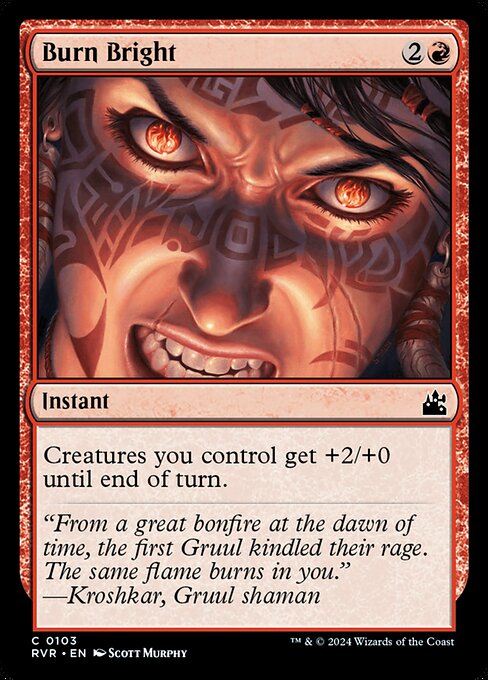
Thank you to Adrienne Reynolds, for her interplanar transcription services.
Mizz Mizzet Portrait by Andres Garcia
Delightful Readers, Please Submit Your Questions to Mizz Mizzet.
You may submit your questions to Mizz Mizzet using this form.
New Mizz Mizzet columns are posted every Wednesday right here as well as in Hipsters of the Coast‘s weekly email newsletter. You are also encouraged to follow her at @MizzMizzet on Twitter.
Any questions answered publicly will be made anonymous, and noms de plume will be created to represent any parties mentioned.
Born a perfect dragon in an imperfect multiverse, Mizz Mizzet (she/her) is the pioneer broodmother of today’s multiplanar civility movement. She is now working to persuade Planeswalkers to participate in it.
Her tireless efforts to expand the understanding and exercise of etiquette beyond the stereotypical terror of too many pieces of silverware, and whether to use poisons or explosives at celebratory conquest dinners, have not escaped official notice.
She specializes as a consultant in seating arrangements for inter and intra planar political events as long as contracts include the option to eat the rude.
Out of respect for her relative’s delicate sensibilities regarding draconic rank, she does not reside on the plane of Ravnica.

